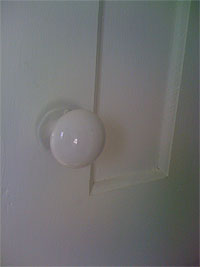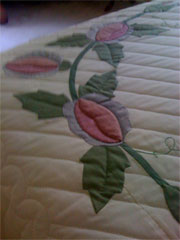Her Closet
Once I got over the childhood fear of what might lurk in the back of my mother’s closet, it became my preferred place of refuge. When it was bath time (on her schedule but not mine) I’d go there and hide for a moment to prepare myself for the inevitable. When the Edge of Night’s twisted plot was too intense to bear, I’d crawl behind her clothes and pull myself together. If I needed to hide or think or calm myself, or suck my thumb without anyone catching me, her closet offered me comfort and privacy.

I’d leave the door ajar; a band of light across the linoleum floor shed enough light for me to see and meant I was not submerged in total darkness. I’d split the row of hanging dresses apart like thick foliage in a jungle and crawl to the back of her closet. Some of the garments were stored in dry cleaning bags, I was careful to steer clear – the fear of suffocation had been impressed upon me when it came to plastic bags – though I liked the feel of the plastic on my shoulders and sensed that the garments within those casings were her most prized, saved for the elegant occasions when other boxes from the top shelf were brought down and set out on the table, boxes with long gloves, beaded bags and silk shoes.
In the back of that closet I could be alone, but still with my mother. I could slide through that curtain of her clothing and squat in the corner and wait. I was waiting for courage, waiting for affection or just waiting until boredom took over – but while I was there waiting, the scent of my mother surrounded me. I was at home among her lightly perfumed clothes and the mildly stale but not unpleasant smell of her shoes. All the things in this closet were hers: the things I saw her wearing and carrying were stored in this private place, it was her domain but it was mine too, for different reasons. It was where I could return to a silent and simple union with her. I could be embraced by her here, by all her things, even if she was somewhere else.
Last winter I was at home to help my mother for about a week before my siblings joined me to say our goodbyes to her. Each day, the rapid decline of her physical capacity required more from me. I could barely find a moment to dress and brush my teeth between the tasks required to assist her; a nearly constant observation became necessary at the end. One day I felt close to some edge – the edge of exhaustion from caretaking a dying woman; the edge of grief, preparing to lose someone I loved too much; the edge of longing, being too far and too long away from De-facto and the girls. So when my mother drifted into an afternoon nap, I found myself drawn to her closet. I ran my hands across the shoulders of her hanging  dresses and blouses. I burrowed through and behind her clothes to the corner of the closet, just like I used to, and with my back against the wall, slid down to sit on the floor, letting the plastic dry cleaning bags brush against me (no longer afraid of suffocation) and permitted myself a short regression to everything that this closet meant to me, to a time when everyone around me was older and larger and their major preoccupation – at least in my view – was to take care of me.
dresses and blouses. I burrowed through and behind her clothes to the corner of the closet, just like I used to, and with my back against the wall, slid down to sit on the floor, letting the plastic dry cleaning bags brush against me (no longer afraid of suffocation) and permitted myself a short regression to everything that this closet meant to me, to a time when everyone around me was older and larger and their major preoccupation – at least in my view – was to take care of me.
I sat there in the back of that closet for only a few moments, my long limbs fit in that corner less comfortably than they did 40-some years ago. But it was long enough to remember what it was like to feel safe and protected, long enough to let tears spill and let go the mounting pressure, long enough to long for the security that something as simple as a mother’s closet could provide.
* * *
My sister and I just spent a week together at my mother’s house to continue the process of emptying it of her personal effects. We have purposely not rushed this process, knowing that grief takes its time and we should too. Yet we know better than to lose momentum, so each month my brother, sister or I (or some combination) travel to the house and endeavor to empty a few more boxes, to give away and throw away a few more things, to prepare the house to be shown to prospective buyers and ultimately to be sold.
The focus of last week’s trip was rather specific: the closets. I had partly to clear out the paraphernalia of my own past. I’d left in her care shoe-boxes filled with letters to friends from summer camp, high school and college folders, and several stuffed animals about to lose their stuffing. But the real task was to address my mother’s wardrobe. For six months we had left her things hanging, but now was the time. My sister and I stood side-by-side in my mother’s closet, touching each and every article of clothing, recalling the occasion when she wore this suit or that sweater-set, remembering how she’d had this skirt made from silk she bought on that trip with the two of us. Once in a while we were even a little surprised at what we found (wow, she owned a leather jacket?) but mostly we were reminded of her good taste and how careful she was to take care of her beautiful garments.

“What are your tears like these days?” said the woman who we’d been told to call to come and take away my mother’s clothing. How naturally she broached the subject, knowing that tears can vary in nature and degree over time. She did not insult us by tiptoeing around our grief. This made it easy to trust her. She gently directed us to attend to other tasks in other rooms while she set about quietly emptying the contents of all my mother’s closets. We did not have to watch her pulling out the hangers and folding our mother’s clothes into black plastic bags. We did not have to help her remove these items that we treasured too much, that held in their fabric too many precious memories. Her discretion was a delicate gift. She was like an angel sweeping in to do the hardest job, and somehow finding a way to take tender care of us while doing it.
After she left, I stood at the door of the closet, emptied of its contents. The shelves were bare. Only a few stray hangers remained. The row of hanging garments that once buffered me from the rest of the world had been dismantled. I stepped in and closed the door behind me, leaving it ajar to let in the familiar strip of light. I swear I could still smell my mother in that closet: the faint hint of Shalimar, the familiar scent of her worn shoes. Was that for real, or just in my memory? Does it matter? As we give away the things that were hers, we commit them to our memory. And our memory of her is something that we’ll always get to keep.


August 16th, 2010 at 6:56 am
Lovely piece.
Caroline
August 16th, 2010 at 1:38 pm
I remember the leather jacket! She purchased it in Buenos Aires, probably in the same shop where we shopped, on separate trips. Shared memories! I am sure you know about your mother’s wardrobe matrix.
August 16th, 2010 at 7:54 pm
I still will go into my son’s room, flop on the bed, close my eyes and smell him…..This despite everything having been washed clean. It is an exquisite torture. Lovely piece of writing.
August 17th, 2010 at 4:19 am
Oh wow! Tears coming from this direction.xxoo
August 17th, 2010 at 10:01 am
Can I confess something here? I spent all day at the beach yesterday with an iranian friend, we talked AND laughed about how we think about our death.
I looked at the shorts I was wearing and said “If I die wearing these, riding my bike, what’s the use of all that stuff hanging in my closet?”.
May be the more you are aware of death the more you cherish every second alive & with loved ones…?
“I swear I could still smell my mother in that closet” <3 I believe you!
August 17th, 2010 at 11:51 am
You have a wonderful way of touching the universal human condition. For those who have been through the “emptying of closets,” is it better to sweep everything away quickly and move on, or to move with a slow measured pace?
It always amazes me how each piece of our parent’s past evokes so many, so tangible memories. Chandeliers, bureaus, vases, a red rolling table, statues, paintings, tools, furniture and postcards all have their stories. They all feed our reflection on days past. Parting with them is separating from far more than simple items in an estate. I still have a storage room with treasured and random leftovers from my Mom and Dad. You’ve reminded me, I need to take another look. A fresh look.
August 17th, 2010 at 4:59 pm
Like very high quality dark chocolate, your stories are beautifully bittersweet.
August 18th, 2010 at 3:19 am
… and another round of tears. I miss her so and your stories remind me why. Her rich life, all she gave to those who loved her. Those memories will never fade. Your writing brings it back for all of us.
August 21st, 2010 at 12:41 am
Oh how I love to read your words. You drew me into her closet. I could feel the weight of her clothing on my shoulders and the fait smell of wear and tear.
You are a wonderful storyteller and I am so happy to have met you. xx
August 31st, 2010 at 4:42 pm
Just reading this I can smell my mother’s closet.
Interestingly, though we’ve done NOTHING with most of her house, we did give away most of her clothes nearly immediately.